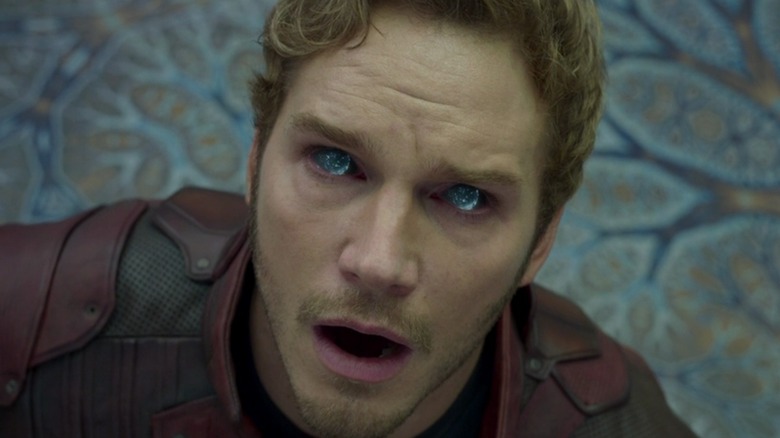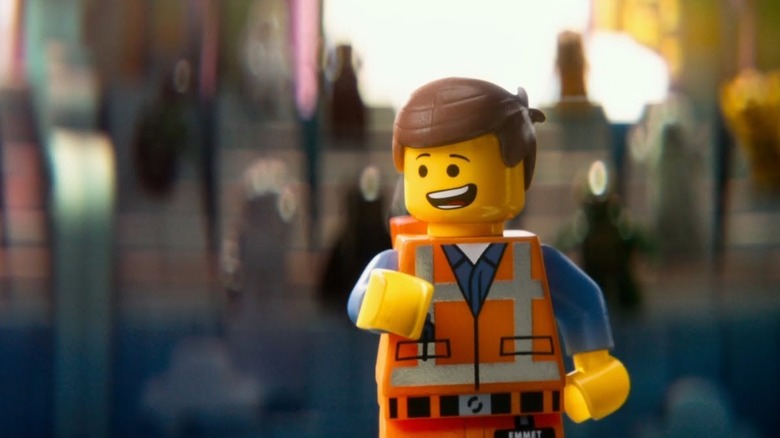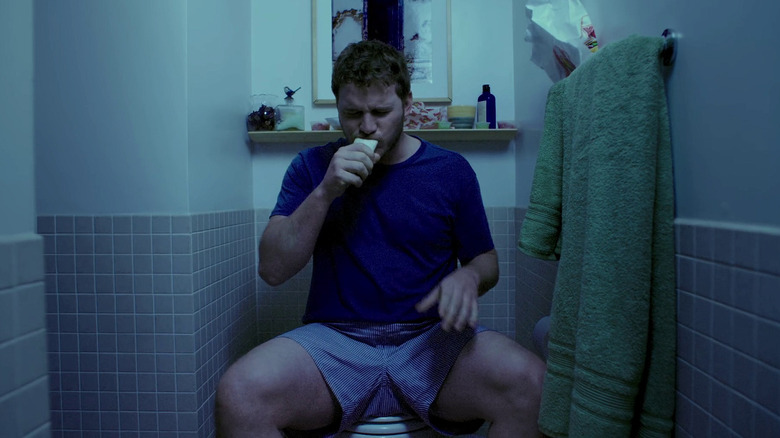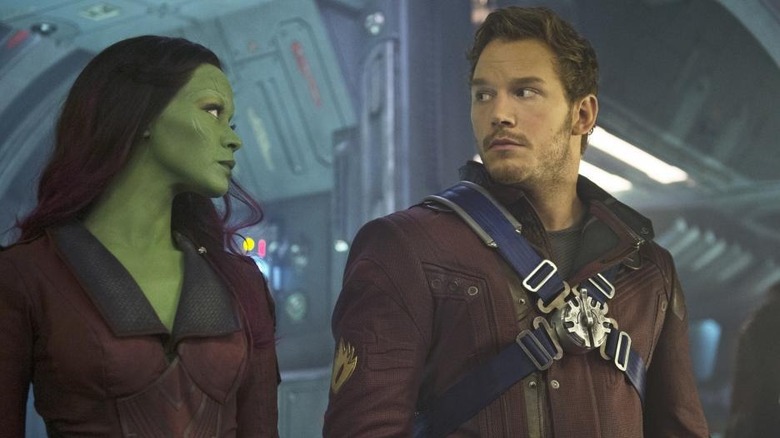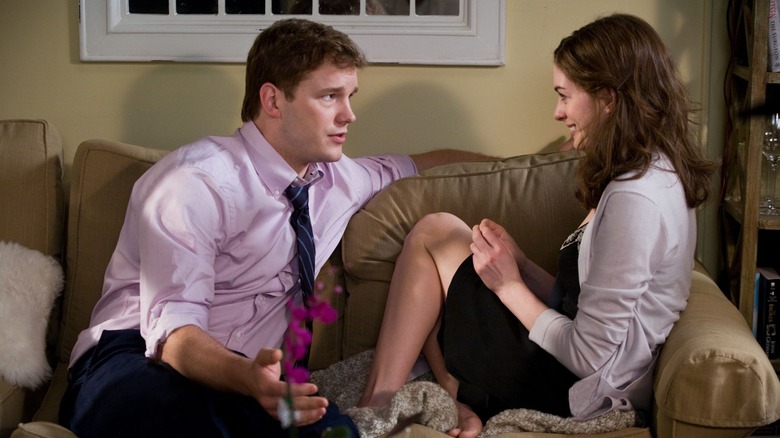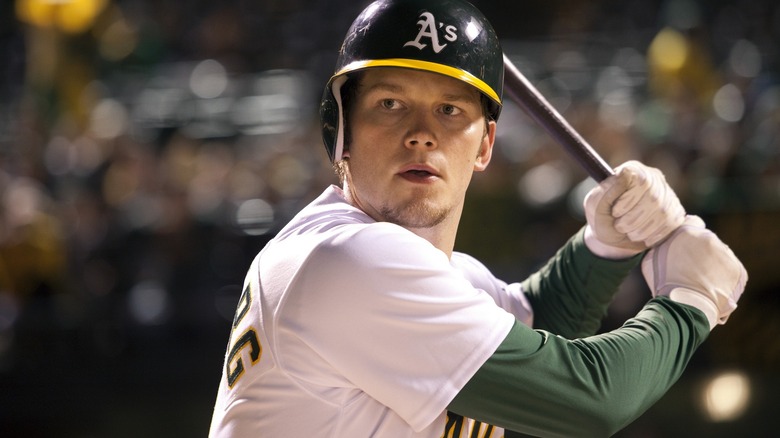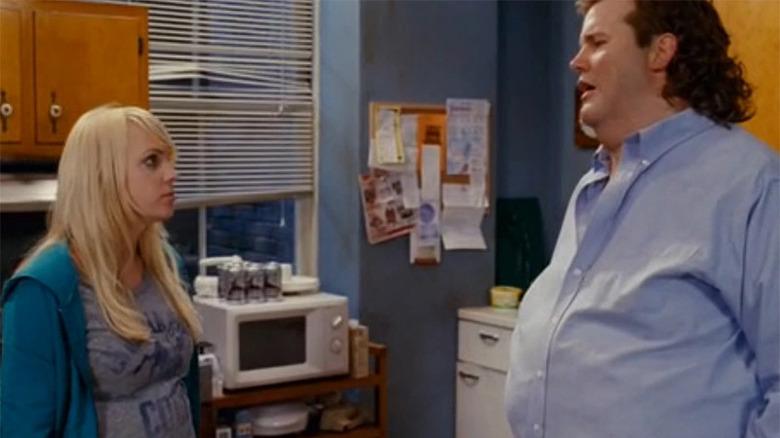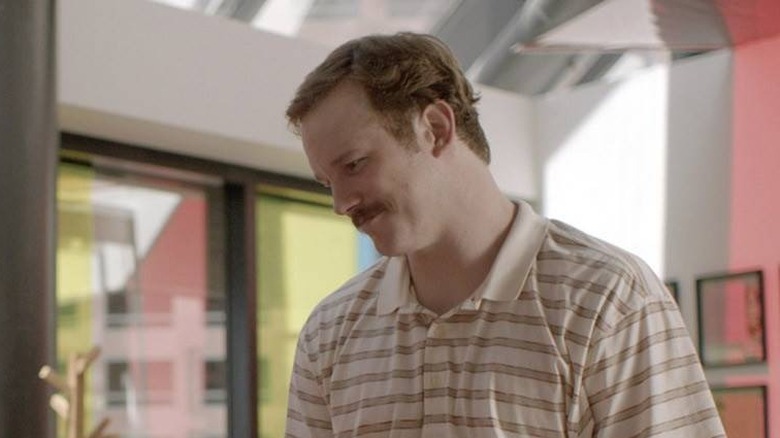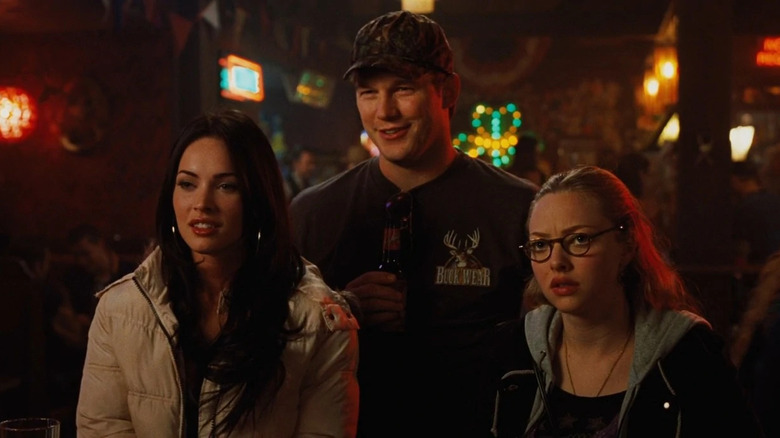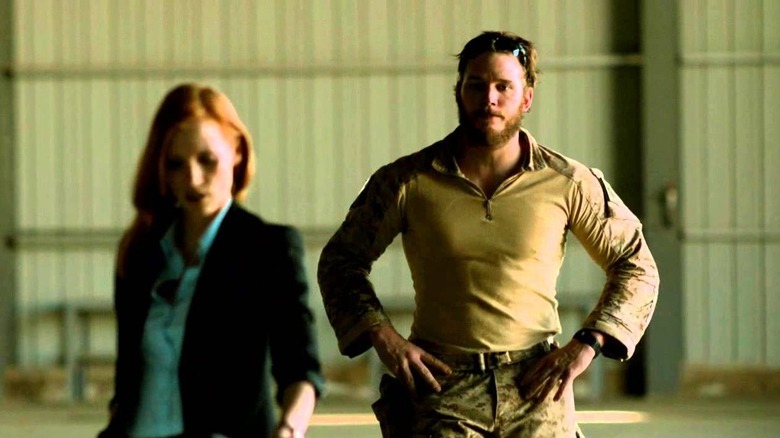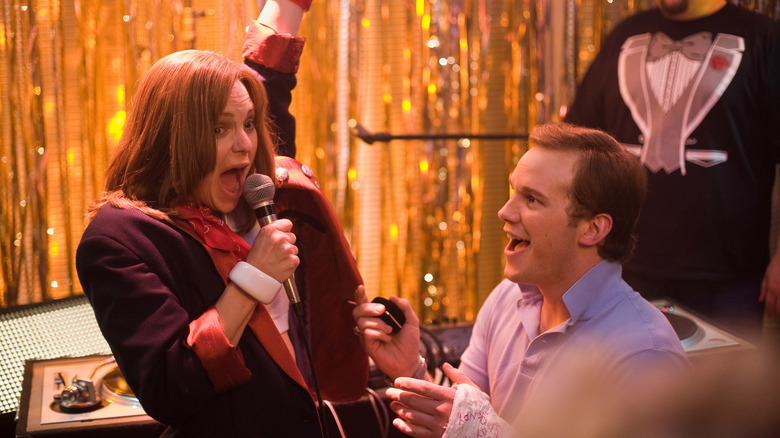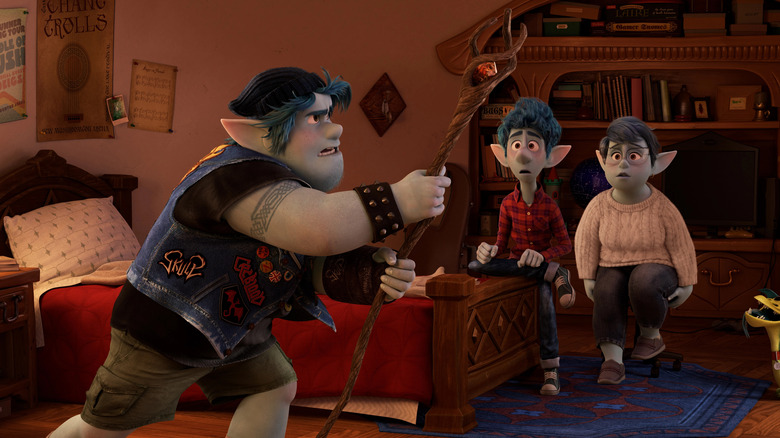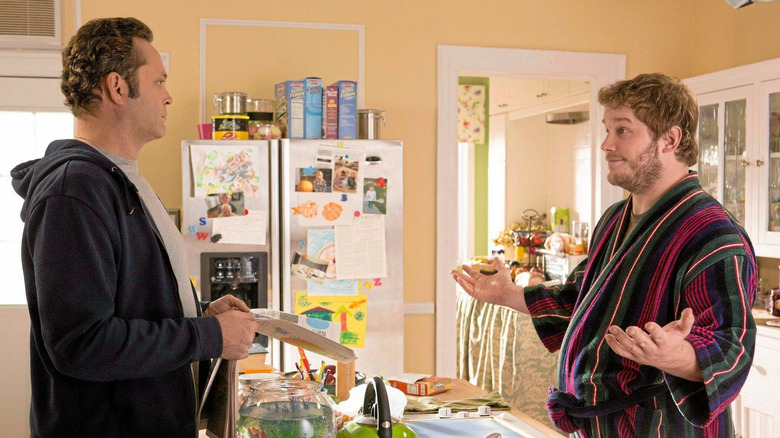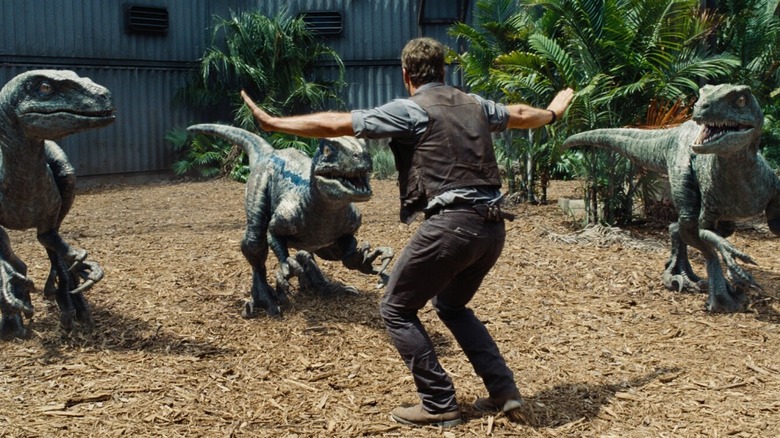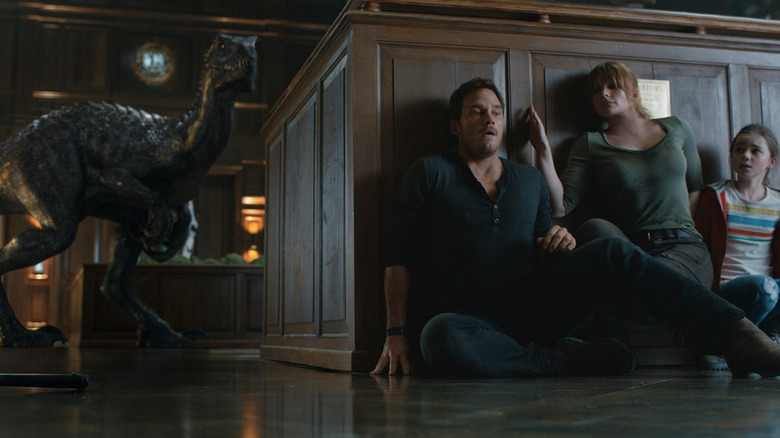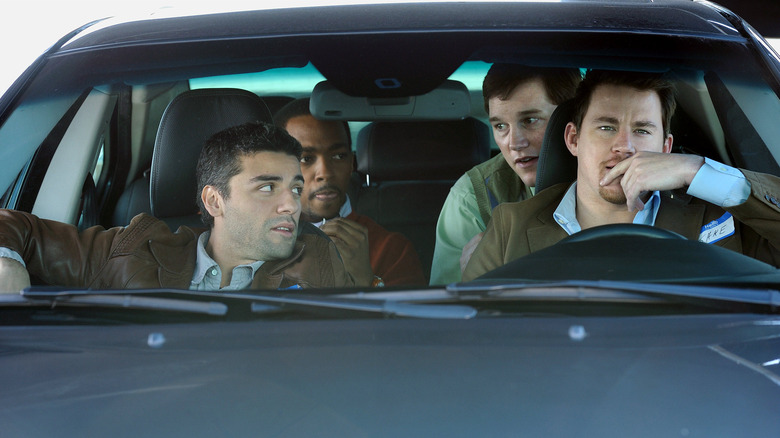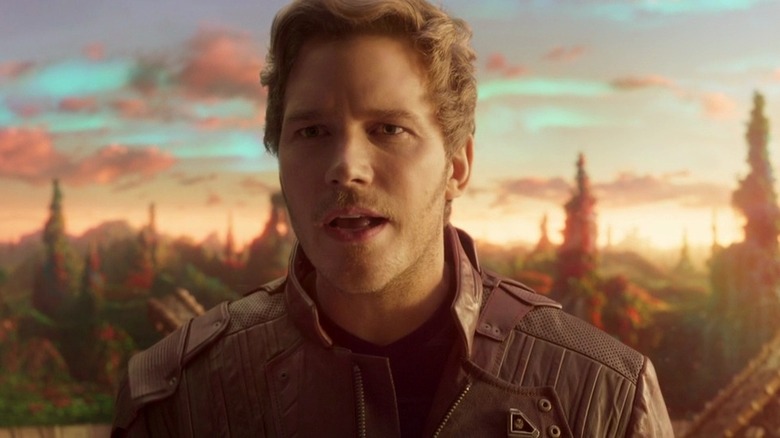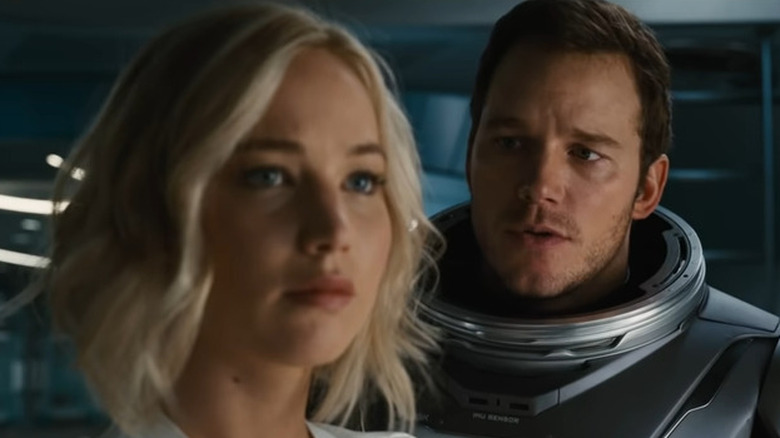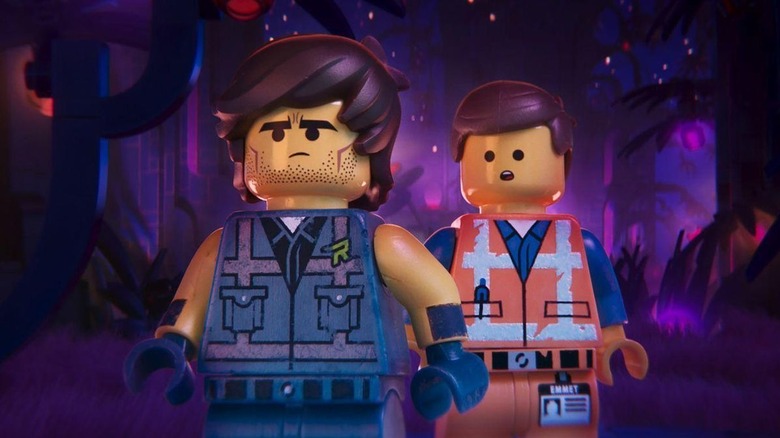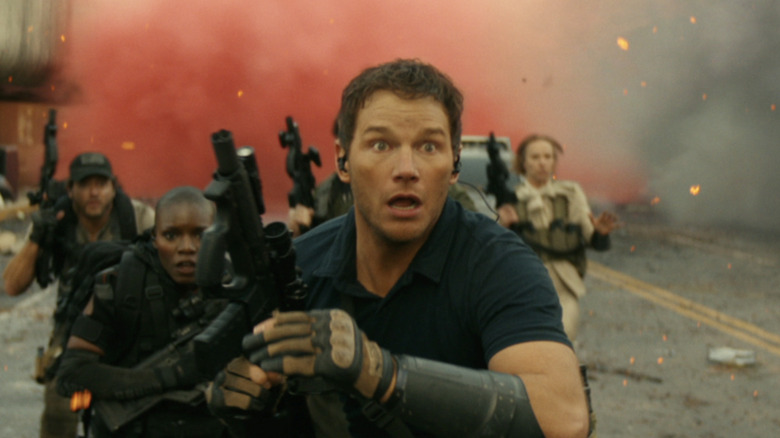Chris Pratt's 10 Best And 10 Worst Movies
Like many a hunky leading man who came before him, Chris Pratt got his start on television, first on the WB's "Everwood," then as loveable doofus Andy Dwyer on NBC's "Parks and Recreation." Throughout his beloved sitcom's run, he shed his silly, squishy alter ego's persona by taking small and supporting roles in films that ranged from campy horror flicks to Oscar contenders. Then, just as "Parks and Rec" was coming to an end, he landed the lead role in not one, not two, but three of what would become some of the biggest franchises of the new century.
As an actor, Pratt is best known for comedy and action. He's often cast as a slacker, buffoon, or jerk, almost always with a heart of gold. In particular, he excels at playing winning losers who the audience can't help but root for. His comedic sensibilities range from stupid-on-purpose humor to smart snark, but as his filmography will show, this naturally funny performer doesn't always work well in traditional rom-coms or raunchy slapstick. Pratt adds a strong and unique flavor to any movie he's in, and that flavor tends to blend best into quirky blockbusters and prestige films. He's also a gifted voice over artist, with vocal work making up a healthy percentage of his resume. These are Pratt's best and worst movies.
Best: The Lego Movie
It's become one of the internet's favorite jokes that Chris Pratt gets cast to voice every character (he'll soon be heard as Garfield and Mario), even if the casting doesn't always make the most sense. That started with 2014's "The Lego Movie" in which Pratt plays Emmet Brickowski, a seemingly unremarkable minifigure who looks like he could've come in just about any construction-themed set. Pratt's casting was a stroke of brilliance, as was his performance.
In "The Lego Movie," Emmet is content to live a by-the-instructions life, getting expensive coffee every morning and watching dumb TV shows every night ... that is, until he finds the Piece of Resistance, meets Wyldestyle (Elizabeth Banks), and gets caught up in a revolution of imagination against the evil President-slash-Lord Business (Will Ferrell).
Emmet could've been a bore, especially since he's surrounded by wackier and edgier characters like Will Arnett's Batman and fellow "Parks and Rec" star Nick Offerman as MetalBeard. But Pratt, who nails Emmet's "aww shucks" innocence and optimism without being annoying, makes his anonymous everyman into the star of the show. "The Lego Movie" went on to be one of the biggest hits of the summer and the best reviewed movies of the year, thanks in part (pun intended) to Chris Pratt's pitch perfect vocal work.
Worst: Movie 43
2013's "Movie 43" is so notoriously poorly made and offensive that critic Richard Roeper called it the "Citizen Kane" of awful. This extremely off-color comedy is actually 12 bad movies in one — each with its own separate director, cast, and title — held together by shaky, meta premise. Dennis Quaid plays Charlie Wessler, a wannabe screenwriter who's pitching to a studio executive, Griffin Schraeder (Greg Kinnear). When Schraeder shuts down his terrible and upsetting ideas, Wessler forces him at gunpoint to listen to the rest of his sordid plots.
"Movie 43" stars a shockingly long list of accomplished actors such as Kate Winslet, Hugh Jackman, and Richard Gere (who reportedly tried to get out of the project), in short films that are each more disturbing than the next. But Chris Pratt and his now ex-wife Anna Faris appear in the most repulsive segment, titled "The Proposition." Pratt plays Doug, a man who's ready to propose to his adorable girlfriend, Julie. But before he can pop the question, Julie decides its time to come clean about her sexual fantasies — including a particularly unsanitary one that Doug doesn't share, but his friends help him realize that he'll have to go along in order for the marriage to work. The less that's said about what transpires in "The Proposition" and in "Movie 43" in general, the better.
Best: Guardians of the Galaxy
"Guardians of the Galaxy" was headed into production just as the Marvel Cinematic Universe was hitting its stride, and Peter Quill (AKA Star-Lord) was one of the most sought after roles in Hollywood. Quill is a deceptively multidimensional character. After his mother died of cancer, he was basically abducted into outer space and now worked as a bounty hunter with a serious humor defense mechanism. Whoever played him would have to be part thespian, part comedian, and part action hero. Pratt had proven that, as an actor, he fit director James Gunn's intended vibe for Star-Lord, but he had to flex a different set of muscles to land the job.
The first "Guardians of the Galaxy" introduces us to the team made up of Pratt's Peter Quill plus Gamora (Zoe Saldaña), Drax (Dave Bautista), Rocket Raccoon (Bradley Cooper), and Groot (Vin Diesel), but it's much more than a simple assemblage of new heroes. "Guardians" marked a major narrative and creative step forward for the MCU. Its plot which sees the rag tag group of cosmic misfits trying to stop Thanos's henchman Ronan from acquiring the Power Stone effectively launches the overarching story of the Infinity Saga. "Guardians" was also noticeably more irreverent and imaginative than previous MCU installments (reasons Steven Spielberg cited it as his favorite superhero movie), which set the tone for films like "Ant-Man" and "Thor: Ragnarok" to come. Chris Pratt's wisecracking and overconfident yet sympathetic Star-Lord helped make "Guardians of the Galaxy" the franchise's most unexpected success with critics and audiences alike.
Worst: Bride Wars
Just as "Parks and Rec" hit the airwaves, one of Chris Pratt's early films, "Bride Wars," hit the multiplexes. This romantic comedy is neither very sweet nor very funny, and worse for Pratt, it doesn't give him much to do. Anne Hathaway and Kate Hudson play Emma and Liv, two best friends who are obsessed with weddings. Since they're both in long term relationships (Emma with Pratt's Fletcher), they fully expect to get engaged and serve as each other's bridesmaid in back-to-back nuptials at the Plaza Hotel in June. But since "Bride Wars" is much more of an everything-goes-wrong comedy than a truly romantic one, the best friends' weddings get booked for the same day due to a clerical error, which turns them into bridezillas and instant mortal enemies.
Hathaway gets to take the big swings in "Bride Wars" while Pratt has to be the buttoned-up love interest who's increasingly concerned about her behavior. This chick flick could've been a clever takedown of the wedding industrial complex. Instead, it caters to some of the worst stereotypes about women, with nasty manufactured gossip and over-the-top catfights a plenty. A too-cheesy and unearned happy ending adds a frustrating final touch. It wasn't a box office bomb, but critics hated it, including Tammy Oler who puts it best: "Women, on-screen and in the audience, deserve better."
Best: Moneyball
2011's "Moneyball" gave a still relatively unknown Chris Pratt a chance to move up to Hollywood's big league. The true story, based on a book of the same name, was adapted by legendary screenwriter Aaron Sorkin and starred Brad Pitt, Philip Seymour Hoffman, and Robin Wright. Pitt also produced. "Moneyball" recounts how Billy Beane (Pitt) and economist Peter Brand (Jonah Hill) used a system called sabermetrics to evaluate prospective baseball players. Beane was the general manager of the Oakland Athletics and was coming off of a disappointing season with some of his best players' contracts set to expire. Brand had devised a mathematical method to mine for hidden talent, in order to stretch the A's limited budget.
Pratt plays real-life slugger Scott Hatteberg who was fighting to stay employed by major league baseball during the early 2000s, when "Moneyball" takes place. Beane gives him a shot based on Brand's calculation of his worth and abilities, and Hatteberg makes the most of it. In the film's climax, Hatteberg hits a walk-off home run to help the A's reach a record 20 game winning streak. "Moneyball" turned what could've been a niche sports drama into one of the most critically acclaimed movies of the year. It allowed Pratt to show that, like Hatteberg, he could do more than people expected of him.
Worst: What's Your Number
2011's "What's Your Number" has a premise that's pretty sexist from the start. Ally Darling (Anna Faris) is in her 30s and is yet to settle down. She reads a magazine article that claims women who've been with 20 or more partners have a harder time snagging a husband, does some quick math, and realizes she's slept with 19 guys. She commits herself to staying celibate until she meets the one, but ends up in bed with the boss who just fired her that very same night. Ally commiserates about relationships with her lothario neighbor, Colin (Chris Evans), who tellingly doesn't judge himself about his own one night stands. Not wanting to add to "her number," she decides to date only from the pool of men she's already hooked up with.
Pratt shows up in not much more than a cameo as Disgusting Donald, Ally's once rotund ex-boyfriend. He's since dropped some pounds and gained a fiancé, and that she might have been wrong about him is what sets her on her trip through lovers past. The fat suit gag isn't at all original or funny, especially considering Pratt was able to be hilarious and endearing at a larger size on "Parks and Rec" without ever turning his weight into a cruel joke. Critics and audiences agreed that Faris, Evans, and Pratt were wasted in this gimmicky comedy in which a large number of desperate attempts at laughs fall flat.
Best: Her
Spike Jonze's "Her" is a masterfully made but subtle movie that's difficult to classify. The film about a man who falls for his artificially intelligent digital assistant premiered in 2013, just a year before Amazon's Alexa became available to consumers. "Her" is set in a near-future and is both a love story and a cautionary tale. Joaquin Phoenix plays Theodore Twombley, a shy beta male type going through a divorce not of his choosing. Ironically, repressed Theodore expresses himself for a living. He works for a company which employs writers to compose meaningful letters for those who can't find the words themselves. The movie hypothesizes that technology is making us all less human, or at least less comfortable with human interaction, and Theodore's soon-to-be ex-wife (Rooney Mara) agrees.
But Theodore discovers his deepest connection with his AI, Samantha (voiced by Scarlett Johansson). As his marriage is dissolving, his relationship with Samantha becomes more serious. Eventually, he decides to go public with their courtship, at which point he learns others are experiencing the same phenomenon, romantically and platonically. But human-computer couplings aren't without their own complications. "Her" received 5 Oscar nominations, including best picture, and Jonze won for his prescient screenplay.
Pratt has a small role as Paul, one of Theodore's coworkers. In this gentle but disquieting alternate reality, Pratt is, like Phoenix, slightly awkward yet still appealing decked out in high-waisted pants and a mustache.
Worst: Jennifer's Body
"Jennifer's Body" was screenwriter Diablo Cody's anticipated follow-up to "Juno," but it was a letdown at the box office and with critics back when it was released in 2009. The horror comedy stars Megan Fox as the titular Jennifer, a popular high school student and cheerleader and Amanda Seyfried as her less popular best friend, nicknamed Needy. Jennifer brings Needy to a bar where a police cadet with whom she's involved named Officer Duda (Pratt) is waiting to see an indie band, but a fire breaks out and kills several of the patrons. While the town's recovering from the tragedy, Jennifer appears to be recovering from a trauma of her own. She arrives at Needy's house dripping in blood.
Needy eventually figures out what happened. The indie rockers made a deal with the devil for fortune and fame, and they offered up teenage Jennifer as their virgin sacrifice. Except, Jennifer wasn't a virgin. Thus, she was transformed into a succubus and has an insatiable hunger for human flesh ... especially the bodies of all those leering boys.
It's hard to call this one of Pratt's worst movies. For one thing, he's in and out of the film before it even gets going. For another, it's become a cult favorite in recent years among fans who think the critical masses missed its feminist subtext. "Jennifer's Body" can be seen as a commentary on objectification, consent, empowerment, and female friendships, but sloppy execution keeps it from being funny, scary, or smart enough to leave its mark.
Best: Zero Dark Thirty
According to its tagline, 2012's "Zero Dark Thirty" tells the story of "the greatest manhunt in history." This dramatization of the CIA's efforts to track down Osama Bin Laden is the second collaboration of director Kathryn Bigelow and screenwriter Mark Boal after their Academy Award winning previous effort, "The Hurt Locker." "Zero Dark Thirty" was almost as much of a tour de force; it was nominated for five Oscars, ranked at or near the top of dozens of critics' top ten lists, and was a modest success at the box office. But the way it depicted torture and composited real-life events and characters made this otherwise great based-on-a-true-story spy thriller somewhat controversial.
Jessica Chastain stars as Maya Harris, the CIA analyst in charge of finding Bin Laden immediately after 9/11. For years, Harris follows leads that go nowhere and loses colleague and friends in the field. An early interrogation resulted in the name of the terrorist leader's personal courier, which she thinks the agency could use uncover his compound, but subsequent information suggests he'd dead. When a piece of information reveals the courier may still be alive, Harris risks her cover to verify it. It all leads up to the war room decision to send Navy SEALS to Abbottabad, where they suspect Bin Laden to be.
Pratt plays Justin Lenihan, a fictionalized version of one of the SEALS who fought inside the house. "Zero Dark Thirty" continues Chris Pratt's early 2010's tradition of filling small but pivotal roles in critically acclaimed movies.
Worst: Take Me Home Tonight
If Chris Pratt's pre-franchise days can teach us anything, it's that this naturally funny actor just doesn't work that well in run-of-the-mill comedies. 2011's "Take Me Home Tonight" is one of many examples. This attempt at a wild romp about a bunch of recent college grads doesn't really add anything to the genre. Topher Grace plays Matt, a directionless guy who isn't living up to his fathers expectations as he works at a video store and pines after his high school crush. Anna Faris is Wendy, Matt's sister, and Pratt is her kind-of-beneath-her boyfriend, Kyle. While Matt tries to impress the object of his affection with lies about his job prospects, cocaine, and a stolen convertible, he's also worrying about Wendy's surprise engagement to Kyle, as he thinks it'll derail her plans to go to an elite grad school.
Pratt and Faris met during preproduction of "Take Me Home Tonight" in 2007 and married themselves in 2008, years before the movie came out. Universal shelved it because the studio didn't know how to market a teen comedy that contained heavy drug use, which necessitated an R rating. It was sold to Relativity Media and made its way to theaters a full four years later, to underwhelming critical and audience response.
Best: Onward
2020's "Onward" had the misfortune of coming to movie theaters mere weeks before COVID-19 shut them down. Disney released the film on its streaming service, which was then only a few months old, shortly thereafter, but "Onward" still largely got lost in the chaos of the early pandemic. That's a shame because — like the two brothers in Pixar's Dungeons & Dragons inspired adventure — it deserved more love and attention.
Ian and Barley Lightfoot (Tom Holland and Chris Pratt) live in a fantasy land that feels like late '90s suburbia. Their father passed away when Barley was a kid and before Ian was born, which means Mr. Lightfoot instilled a passion for role-playing games and mythology in his older son (whose maturity has stunted), while the younger son idolizes the man he never got to meet. When their mom (Julia Louis-Dreyfus) gives them their father's supposedly magical staff and a corresponding visitation spell that will supposedly bring him back for a day, Barley's a believer while Ian's a skeptic. But it turns out, Ian possesses the magic necessary to make it work. Being brand new to wizardry, he botches the spell and breaks the staff's gem, which sets the brothers and their father's lower body on a quest to find a replacement.
Holland is admirable as insecure, straight-laced Ian, but Pratt steals the movie as the secretly well-adjusted fanboy Barley — so much so that you might wish the lead and supporting roles were switched. D&D aficionados will appreciate the many in-jokes, but everyone will relate the movie's themes of awkwardness.
Worst: Delivery Man
2013's "Delivery Man" is a remake of the Canadian film "Starbuck," and most critics agreed that the original was better ... with one exception. Vince Vaughn plays meat truck driver and prolific sperm donor David Wozniak, who's gotten himself into serious debt with some shady characters. David learns that his donations have resulted in the birth of 533 children, many of whom have joined a class action lawsuit in hopes the fertility clinic will reveal their father's identity. The men he owes money to are a risk to his own family (his father and pregnant girlfriend, who also happens to be with the NYPD), so David relies on his friend Brett (Pratt) — a lawyer and overwhelmed dad — to help him countersue for $200,000 and keep his records sealed.
"Delivery Man" isn't afraid to be bawdy (as much as its PG-13 rating will allow) or sentimental, which makes this dramedy watchable if not quite good. What starts as a typical Vaughn-style comedy about a callous loser of a leading man getting into trouble morphs at about the halfway point into a feel-good story about the miracle of life, as David sets out to meet and become a guardian angel to his progeny. Some reviews dinged Vaughn for his limited range as an actor, but many singled Pratt out for elevating the role of goofy sidekick into something more lived-in and substantive.
Best: Jurassic World
After 14 years of dormancy, the "Jurassic Park" franchise roared back to life with 2015's "Jurassic World." The movie had been in development for over a decade, with the plot and cast list undergoing major changes along the way. In the end, Pratt nabbed the coveted role of Owen Grady, former Naval officer and current dinosaur wrangler for the finally functional Isla Nublar theme park.
In "Jurassic World," operations manager Claire (Bryce Dallas Howard) invites her nephews to visit the park. Among the popular attractions: a massive Mosasaurus in a Sea World-like enclosure and a new genetic hybrid species called the Indominus rex, which promises to be even more fascinating and ferocious than the T-rex. Because this is a "Jurassic Park" movie, the Indominus (with its raptor intelligence, a T-rex size and strength, and camouflage) escapes its paddock and causes mortal mayhem throughout the facility. Claire needs dino whisperer Owen and his four velociraptors (trained via a military-funded program) to save the day.
Owen Grady is a thinly-drawn character compared to Star-Lord or even Emmet Brickowski (a fact that's spoofed in another Pratt film). Still, he makes the oversized and often ridiculous material work. "Jurassic World" is more like a soft reboot of "Jurassic Park" than a continuation of the earlier trilogy's story. It doesn't come close to the masterpiece original, but it is satisfying to see the park open to the public as Dr. Hammond intended, however briefly. Audiences were clearly ready to go back; "Jurassic World" was the highest grossing movie of its year (beating out "The Force Awakens") and remains in the all-time box office top ten.
Worst: Jurassic World: Fallen Kingdom
The "Jurassic Park" sequels walk a fine line between quality blockbuster cinema and self-aware camp. 2018's "Jurassic World: Fallen Kingdom" falls hard into the latter category as it attempts to incorporate some of the crazier ideas from abandoned "Jurassic Park" projects past. If over-the-top action sequences and references to horror tropes are your thing, you might just love "Jurassic World: Fallen Kingdom." Critics did not, and though audiences still flocked to the theaters in droves, they too were less than impressed with this fifth effort.
Claire has undergone a complete personality change. No longer a boss babe, she now heads a PETA-like group dedicated to saving the prehistoric animals, in contrast to Dr. Ian Malcolm (Jeff Goldblum returning in a cameo) who argues before Congress in favor of their extinction. Hammond's old partner invites Claire to his mansion where his assistant Eli (Rafe Spall) tricks her and Owen into relocating the stranded dinos from Isla Nublar to the mainland. Eli and his conspirators aren't interested in the animals' wellbeing; they plan to make millions off of them in a secret auction held in the mansion's basement, particularly from the latest hybrid, a stealthy and highly intelligent new species called the Indoraptor that comes combat-ready.
Of course, the Indoraptor escapes, which turns "Jurassic World: Fallen Kingdom" into what's essentially a haunted house movie, where a genetically modified dinosaur plays the role of ghost or monster. Pratt's Owen has even less to do here; he spends most of his time watching, running, and hiding. The film ends as our heroes make some discoveries about human cloning and set the captive dinosaurs free, teeing up the final installment of the franchise: "Jurassic World Dominion."
Best: Avengers: Infinity War
Because of the sheer number of characters and plotlines that have to be incorporated in 2018's "Avengers: Infinity War," nobody really gets that much screen time. But the first of the two films that comprise the culmination of the Infinity Saga contains much more Star-Lord than the second, so that's why it and not "Avengers: End Game" is featured on this list.
Pratt's Peter Quill actually has more to do than most of the original six Avengers here. His ship rescues the stranded Asgardian survivors, which sets up a hilarious rivalry between the self-assured Thor and the half-Celestial Quill, whose masculinity is threatened by the Norse god. But Quill's story takes a more somber turn when he, Gamora, Drax, and Mantis travel to Knowhere, where they plan to get to the Collector and the Reality Stone before Thanos does. Unfortunately, the purple Titan arrives first and uses the stone to create illusions that trick the Guardians. Gamora had previously made Star-Lord promise that if Thanos ever captured her, he'd kill her as a protective measure. Though he doesn't understand, he tries to hold up his end of the bargain, but Thanos distorts reality to turn his blaster into a bubble gun and kidnaps Gamora. Soon after, he sacrifices his daughter on Vormir to acquire the Soul Stone.
When Thanos reveals that Gamora's dead, Star-Lord loses control and attacks, which disrupts the Avengers' agreed upon plan and results in Thanos acquiring the Time Stone from Doctor Strange. Though he's among the snapped, Peter Quill is arguably one of the most important and tragic figures of "Avengers: Infinity War," which is possibly the most consequential and reverberating chapter in the MCU.
Worst: 10 Years
2011's "10 years" reunites Pratt with his "Parks and Recreation" love interest, Aubrey Plaza, and teams him up with some of the actors who would go on to become his fellow MCU superheroes, Anthony Mackie and Oscar Isaac. That's fitting, since this mediocre comedy is about a high school reunion. "10 years" stars Channing Tatum (who first produced a short film version of the project to attract funding for this feature) as Jake, a guy attending a party to mark 10 years post-graduation with his girlfriend Jesse (Jenna Dewan) to whom he's about to propose.
During the festivities, Jake runs into his ex, Mary (Rosario Dawson). As they reconnect, a seemingly miffed Jesse goes back to the hotel. Meanwhile, Jake's former classmates all evaluate how their own lives have progressed (or not) through their 20s. Pratt plays Cully, a bully with a drinking problem who tries and fails to atone for his old ways, all while annoying his wife. Isaac is Reeves, an alum who has since become a rock star thanks to his ballad about the nerdy girl he had feelings for back in school, who's also in attendance.
Critics gave "10 years" mixed reviews, pointing out that while its characters weren't very multidimensional, it managed to hit the right emotional notes and avoided being overly cliché. However, the few viewers who sought out the movie (which was a box-office bomb, only making about $200,000 in the U.S.) liked it less.
Best: Guardians of the Galaxy: Vol. 2
2017's "Guardians of the Galaxy Vol. 2" doesn't mess with the formula that made the first volume a hit. The gang's still together and grooving out to a soundtrack of classic '70s bangers, though Groot has regenerated into a petulant toddler, and there are still plenty of bad guys roaming space to keep the Guardians gainfully employed. Rocket sets the movie on its course when he steals valuable batteries from the Sovereign, a race of gold aliens who defend themselves via drones. A mysterious man named Ego comes to their rescue and, shortly thereafter, reveals himself to be a type of god known as a Celestial — as well as Peter's real father.
Daddy issues run deep throughout genre fiction (ask anyone from Luke Skywalker to Tony Stark) but "Guardians of the Galaxy Vol. 2" takes father-son tension to another level. At first, Peter's taken in by Ego's radiant positivity, self-confidence, and ambition, even as his friends sense the living planet is too good to be true. Only when Star-Lord gets to the core of his father's malignant narcissism does he begin to assess his own shortcomings. The plot and the moral lessons here are well-executed, if fairly predictable. Still, "Guardians 2" lives up to the original because we know these zany characters better now (and so do the actors who play them), which lends even more specificity to Star-Lord and company's very particular brand of humor. The needle drops and the jokes all land, and Pratt is as charismatic as ever portraying a more vulnerable Peter Quill.
Worst: Passengers
2016's "Passengers" starred Chris Pratt and Jennifer Lawrence at the height of their fame. Pratt was coming off of "Guardians of the Galaxy" and "Jurassic World," while Lawrence had been nominated for four Oscars in six years (she won in 2013 for "Silver Linings Playbook) and was wrapping up the "Hunger Games" franchise. "Passengers" — a glossy, big-budget, prestige sci-fi film — should've been an astronomical success. Instead, it divided critics and audiences like the cilantro of space movies.
Set in a mid-future dystopia, "Passengers" tells the story of a ship called the Avalon that's carrying 5,000 "colonists" plus some crew members to a new habitable planet that's more than 100 years' journey away. Since the ship's guests would die on their voyage otherwise, they're put to sleep in hibernation pods and are scheduled to wake upon landing. Jim (Pratt) gets woken up early by a crash and is despondent to discover that the Avalon is still a ways out. He lives for a while with a droid named Arthur as company, but when he sees a beautiful woman named Aurora (Lawrence) in a pod, he can't resist the urge to bring her out of hibernation.
It's that early plot point that was a bridge too far for some viewers. Critics praised Pratt and Lawrence for their performances in what's for much of its runtime a two person show, and the film's production design and score were nominated for multiple awards. However, the on-again-off-again love story that follows Jim's initial unforgiveable act ultimately taints the believability of the movie as much as it does Jim and Aurora's problematic romance.
Best: The Lego Movie 2: The Second Part
After "The Lego Movie" surpassed expectations, Warner Bros. spun their plasticky new intellectual property into multiple spin-offs. But after "The Lego Batman Movie" (very funny) and "The Lego Ninjago Movie" (just okay) came the true sequel to the original, 2019's "The Lego Movie 2: The Second Part." This follow-up manages to maintain the meta, self-referential humor, though the plot is more contrived and the way things fit together at the end doesn't produce as impressive a final product. Still, "The Lego Movie 2" has its moments and still ranks among Pratt's most popular films with critics and fans alike.
It's been five years since Finn's dad finally let him play with his expensive Lego collection. He's a teenager now, and he's refashioned Bricksburg into Apocalypseburg. The minifigures are awaiting the foretold "armamageddon" (when Finn and his sister's fighting forces their mother to take their blocks away) as they're abducted to the "Systar System" (Finn's sister's room), where Queen Watevra Wa'Nabi (Tiffany Haddish) rules with a fabulous iron fist. Wyldestyle thinks her possibly coerced marriage to Batman is a ruse to distract from armamageddon, so Emmet sets off to save their imaginary world.
He crashes his ship and crosses paths with Rex Dangervest, an obvious allusion to Pratt's MCU and "Jurassic World" characters, complete with computer proficient velociraptors. That Pratt voices Rex and Emmet, both self-deprecatingly, is hilarious and surprisingly insightful. Some of "The Lego Movie 2" is retread (like its second try at an annoying earworm of a theme song) but — as the movie suggests is the case with Legos themselves — even though it's not perfect, it's still worth sharing with friends.
Worst: The Tomorrow War
In another timeline, "The Tomorrow War" could've been a typical summer blockbuster. It was scheduled for theatrical release when the pandemic upended the industry, then Amazon purchased the rights and released it on Prime Video in July of 2021. It was enough of a hit that it's getting a sequel, and critics were generally kind to Pratt and especially complimentary of his co-star, Sam Richardson. But this militaristic sci-fi franchise starter is a little too derivative to compete with the big guns.
During the 2022 World Cup, soldiers from 2051 appear on the field seemingly out of nowhere. They warn humanity that, in just a few short decades, terrifying aliens called Whitespikes will kill off most of the Earth's population. They request backup from the past and — in one of many conceits that test the suspension of the audience's belief — the world's nations band together to fight an unseen threat from the future. Warriors go forward in time through a wormhole, but since not many make it back, a draft has to be implemented.
"The Tomorrow War" is a fine thrill ride from your couch, as long as you don't think too hard about it. The plot is held together by arbitrary rules (soldiers deploy for seven days, most are middle-aged so they don't meet themselves and cause a paradox), and the big twist is predictable to anyone who's ever seen a time travel movie centered around family. The final act veers into absurdity and shoots the premise full of plot holes.
